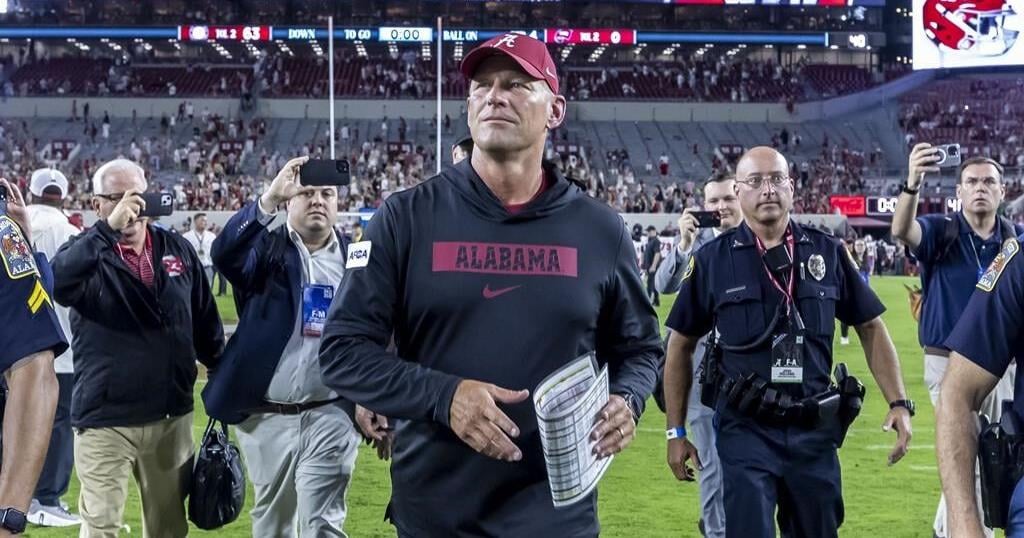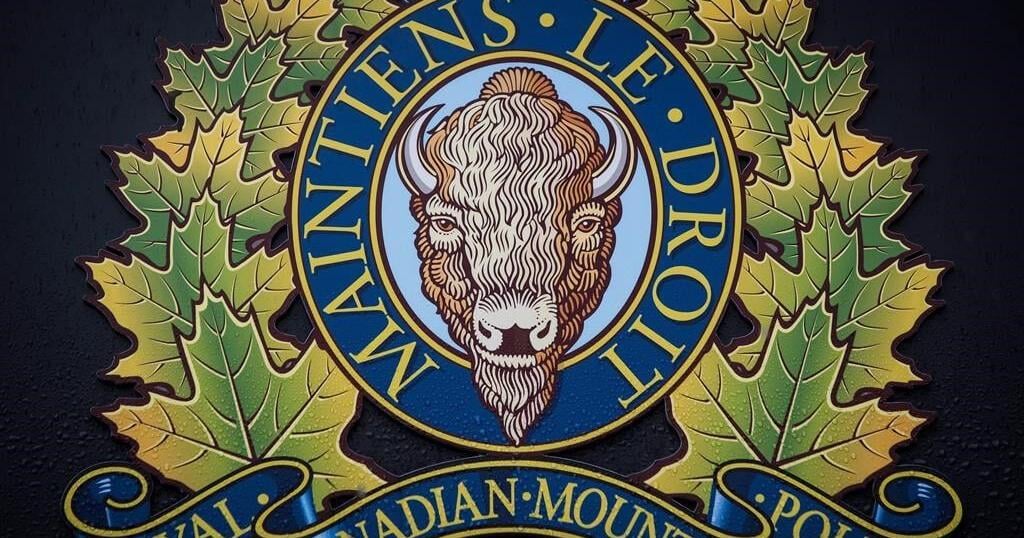Here’s a scenario that Alabama was not prepared for in Week 1: getting offensive coordinator Nick Sheridan down from the press box to the field as quickly as possible, during the game, so he could keep calling plays.
Here’s why it had to happen: The Crimson Tide were playing Western Kentucky, and because the Hilltoppers’ headsets — part of a new wrinkle to college football this season — stopped working, Alabama by rule couldn’t use its headsets, either. So, Sheridan had to make an unplanned dash to the field to keep communicating with Tide quarterback Jalen Milroe.
“I thought our staff did a great job,” Alabama coach Kalen DeBoer said after the 63-0 win in his debut at the school, “because that’s something you don’t practice.”
Helmet communication has come to major college football, with a single player on each team designated with a green dot on his helmet — the quarterback on offense, typically the on-field play-caller on defense — being able to hear voice instructions from the sideline until 15 seconds remains on the play clock. It’s a new option for this season after being experimented with for bowl games a year ago, and in theory it’ll replace signs being sent in from the sideline through hand signals.
Early returns on the new gizmos were mixed. Some liked it. Some didn’t.
“It helped us some, but it kept messing up,” said Florida International coach Mike MacIntyre, whose team lost 31-7 in its opener at Indiana. “It kept going in and out all of the time on us. We have been working on it for a while. I don’t know why it keeps going in and out.”
Even when the headsets work, there’s another challenge: noise.
The first real game of the season was a Week 0 matchup between Georgia Tech and Florida State in Ireland. By big-time college football standards, it was far from a huge crowd in Dublin, with 47,998 people in the seats.
But it was loud. Very loud. Georgia Tech quarterback Haynes King kept having to cover the ear holes in his helmet with his hands, trying to muffle fan noise while he listened to what was being barked in from the sideline. And he was hardly alone; players all over college football were trying the same thing this weekend.
“You probably saw me cover my ears a couple times, trying to get it, ‘What’d you say?’” East Carolina linebacker Zakye Barker said after his team’s win over Norfolk State. “That’s a good problem to have. It means y’all showed up and showed out for us.”
There’s no question it was a fascinating aspect to the opening games of college football. Some teams, such as UTEP for its game against Nebraska, even allowed broadcasters to air some of the coach-to-player audio during games.
And it wasn’t easy to hear. Think walkie-talkie level of audio, at best.
“It was definitely different,” Georgia quarterback Carson Beck said after the top-ranked Bulldogs opened with a win over Clemson. “I liked it a lot personally. There’s still some times where you look over to the sidelines and we’re not going — we’re going slow, we’re not going fast, and you still look at the signal, confirm everything. But I definitely think it picks up the pace of the game and allows us to play faster on offense, play to play.”
Said TCU quarterback Josh Hoover, who guided his team past Stanford for a Week 1 win: “It was fine. It was good. We did a good job I thought breaking the huddle on time. … I thought it went well. Pretty smooth for the first time out.”
The helmet communication hasn’t fully replaced hand signals, placards, flags and whatever other methods teams have been using to send plays in from the sideline. Miami, anticipating serious crowd noise for its opening game at Florida, had multiple methods of play-calling ready in case the headsets didn’t work optimally.
The headsets worked fine, and Miami quarterback Cam Ward pointed out to Florida fans afterward that they weren’t very loud.
“Game 1 to Game 2, you’ve got to find some of your biggest jumps,” Wisconsin coach Luke Fickell said. “That’s not just in the play. It’s in communication. It’s in some of these technology things that we have afforded to us. But there’s a lot of things that will give us an opportunity to get a lot better.”
Not every player has the sideline communication device in his helmet. That was particularly problematic for some teams: NC State linebacker Caden Fordham — who had the headset for the Wolfpack — was ejected with a first-series targeting penalty against Western Carolina, meaning the team had to switch to linebacker Sean Brown as the on-field defensive communications point person. Same thing happened to Western Michigan, which saw linebacker Jacob Wahlberg ejected from the game in the first half against Wisconsin.
“It actually is a bigger loss than maybe in the past,” Western Michigan coach Lance Taylor said. “You’ve got your mic linebacker, who communicates everything to everybody because he’s talking to the coordinator, and now he’s out of the game for 3 1/2 quarters. It was a huge loss.”
Adjustments will be made, of course. Everyone will get more and more comfortable with the new system going forward. Most coaches agree that the added technology will help the game, which is the whole point.
And for UCF coach Gus Malzahn, when it comes to the headsets, he says he’ll employ a less-is-more approach while talking to his quarterbacks.
“I’m trying not to talk too much,” Malzahn said. “Let the guy play.”
___
AP Sports Writers Josh Dubow, Steve Megargee, Aaron Beard and Michael Marot contributed to this report.
___
Get poll alerts and updates on the AP Top 25 throughout the season. Sign up here. AP college football: and

























